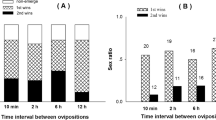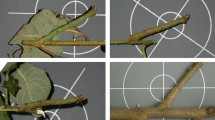Abstract
IN a previous communication1, Dr. Salt and Miss Laing asserted that individual females of Trichogramma evanescens avoid host eggs which have already received the attention of other individuals of the same species. In the experiment described, a parasite was allowed to walk on, but not to parasitise, some host eggs. The parasite was then removed, and clean eggs placed alternately with the others. A second parasite was introduced which ” avoided the hosts that had been visited by the first, as though they had already been parasitised”. From this is deduced that the sense of smell warns the parasites of those eggs which have received attention, so that they leave them alone.
This is a preview of subscription content, access via your institution
Access options
Subscribe to this journal
Receive 51 print issues and online access
$199.00 per year
only $3.90 per issue
Buy this article
- Purchase on Springer Link
- Instant access to full article PDF
Prices may be subject to local taxes which are calculated during checkout
Similar content being viewed by others
References
NATURE, 135, 792, May 11 (1935).
Author information
Authors and Affiliations
Rights and permissions
About this article
Cite this article
KING, C. Discriminative Ability of a Parasitoid. Nature 137, 32–33 (1936). https://doi.org/10.1038/137032b0
Issue Date:
DOI: https://doi.org/10.1038/137032b0
Comments
By submitting a comment you agree to abide by our Terms and Community Guidelines. If you find something abusive or that does not comply with our terms or guidelines please flag it as inappropriate.



